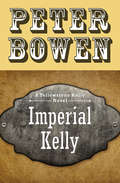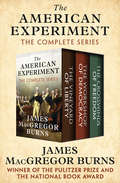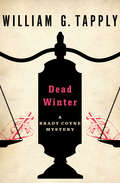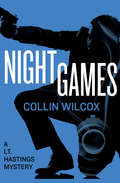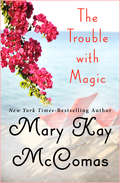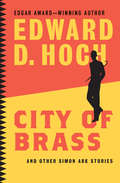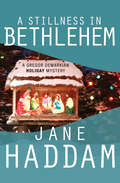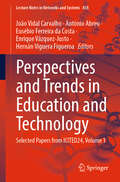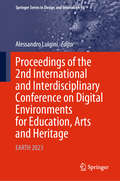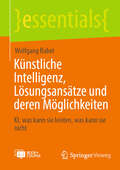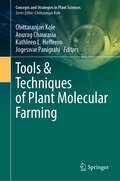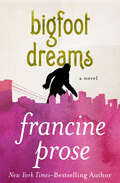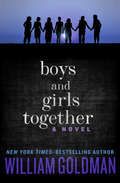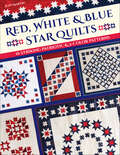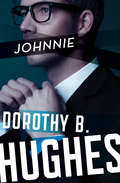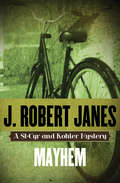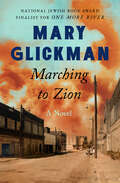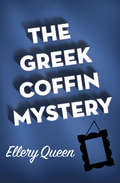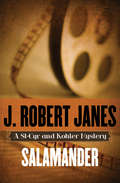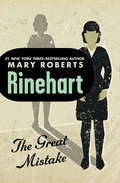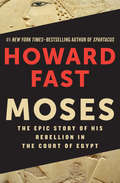- Table View
- List View
Imperial Kelly: Yellowstone Kelly, Kelly Blue, Imperial Kelly, And Kelly And The Three-toed Horse (The Yellowstone Kelly Novels #3)
by Peter BowenYellowstone Kelly has dealt with Indians, Zulus, hapless Brits, and Mormons. Now the intrepid scout meets his greatest challenge: Theodore Roosevelt.Nowadays US Army Major Luther &“Yellowstone&” Kelly isn&’t the young lively man he once was. He&’s cantankerous, stubborn, and his nagging illnesses are exacerbated by the slightest provocation. Still, Kelly is called back into action by his most irritating boss yet: a young assistant secretary of the navy by the name of Theodore &“Teethadore&” Roosevelt. The future president needs a crew of toughs to join his Rough Riders outfit, and he correctly reckons that Kelly has an inside track on some of the nastiest ones. Kelly enlists a rascally crew, including his friends Butch Cassidy and the Sundance Kid, and helps Roosevelt win the Spanish-American War. Next an impressive piece of jade leads him over the Pacific, before he&’s summoned to observe the outbreak of the Boer War. While sailing to southern Africa, he runs into Winston Churchill in Mozambique . . . and on Kelly stumbles into other areas of the history books. Whether he&’s being chased by Boers or Igorote tribesmen, Kelly always maintains his trademark cynicism and resourcefulness, somehow finding a way to always land on his feet—even if Teethadore is determined to take credit for it.
The American Experiment: The Vineyard of Liberty, The Workshop of Democracy, and The Crosswinds of Freedom (The American Experiment #1)
by James MacGregor BurnsThe Pulitzer Prize–winning author&’s stunning trilogy of American history, spanning the birth of the Constitution to the final days of the Cold War. In these three volumes, Pulitzer Prize– and National Book Award–winner James MacGregor Burns chronicles with depth and narrative panache the most significant cultural, economic, and political events of American history. In The Vineyard of Liberty, he combines the color and texture of early American life with meticulous scholarship. Focusing on the tensions leading up to the Civil War, Burns brilliantly shows how Americans became divided over the meaning of Liberty. In The Workshop of Democracy, Burns explores more than a half-century of dramatic growth and transformation of the American landscape, through the addition of dozens of new states, the shattering tragedy of the First World War, the explosion of industry, and, in the end, the emergence of the United States as a new global power. And in The Crosswinds of Freedom, Burns offers an articulate and incisive examination of the US during its rise to become the world&’s sole superpower—through the Great Depression, the Second World War, the Cold War, and the rapid pace of technological change that gave rise to the &“American Century.&”
Dead Winter (The Brady Coyne Mysteries #8)
by William G. TapplyWhen a minister&’s son is accused of murder, Boston lawyer Brady Coyne doesn&’t know whom to trust in this &“very satisfying caper&” (Publishers Weekly). Desmond Winters has had more trouble than a Unitarian minister deserves. Over six years ago, his wife disappeared with their fourteen-year-old daughter, promising to return someday. The daughter came back after six months; the wife never did. The experience scarred Desmond&’s son, Marc, who acted out by getting involved with cocaine smugglers and marrying an exotic dancer. Through all his troubles, Des was counseled by Brady Coyne, a sensitive lawyer to Boston&’s elite. But now something has happened that even Brady may not be able to fix: Marc&’s wife is dead, and the minister&’s son is the prime suspect. Marc finds Maggie dead in their boat, and calls the police immediately. Brady doesn&’t believe Marc murdered his wife, but he also knows that in this family, anything is possible. It could be drugs, it could be the missing mother—but a beautiful young girl is dead, and Brady Coyne needs to know why.
Night Games (The Lt. Hastings Mysteries #12)
by Collin WilcoxHastings investigates a murder among a set of wealthy adulterersBy the time Haney and the woman get to her apartment, they are so drunk they can hardly get through the door. They undress and begin to fool around, but before they make it to the bedroom, they have an argument. Haney is about to leave when the woman starts to laugh at him. He spins around and slugs her as hard as he can. His head is beginning to clear by the time he makes it home. He&’s just sober enough to notice the glint of a dagger before it&’s buried in his gut.Haney&’s wife finds his body at the foot of the stairs. She calls the police, but cannot tell them the truth about the evening—that she and her husband were both in other people&’s beds. Lieutenant Frank Hastings has no trouble interrogating criminals, but untangling this web of marital lies will be one of the trickiest cases of his career.
The Trouble with Magic
by Mary Kay McComasTwo people, locked in a bitter battle, find their lives forever changed by the irresistible pull of an ancient legendHarriet Wheaton is out of options. Her manor house on Jovette Island is in foreclosure and, in a desperate attempt to save it, she invites Payton Dunsmore to view her home. She feels sure that once he sees how important it is to her, he will stop pressing for the foreclosure and compromise with her. But when Payton arrives, it&’s not the house that captures his attention. He&’s undeniably drawn to stubborn, passionate Harriet, but still has no intention of saving the manor. Past the point of an amicable resolution, Harriet plays her last card, marooning them on the island and turning to the old Jovette legend that those who arrive as enemies will leave as lovers. But will the legend really work its magic and save her family legacy? And will Harriet be able to hold onto Payton&’s heart without knowing if his passion is part of a spell or the real magic of love? This ebook features an extended biography of Mary Kay McComas.
The Avignon Quintet: Monsieur, Livia, Constance, Sebastian, and Quinx (The Avignon Quintet #3)
by Lawrence DurrellFrom the visionary author of the Alexandria Quartet comes a landmark five-part series hailed by the Sunday Times as &“one of the great novels of our time.&” One of the most celebrated English writers ever, Lawrence Durrell was a bestselling author whose vivid metafictions pushed the boundaries of modern literature. The cosmopolitan provocateur transcended borders, ideologies, and time in his work, and he&’s at the height of his powers in the Avignon Quintet. More formally daring than the Alexandria Quartet, these sweeping and stylish novels set before, during, and after World War II loosely center on the race to uncover a treasure buried by the Knights Templar. Each reveals a seemingly disparate piece of the puzzle. In Monsieur, it&’s the bittersweet return to southern France by a British doctor; in Livia, it&’s two sisters driven apart by the rise of Nazism in Europe. In Constance, a Freudian analyst struggles for clarity in a world on fire; in Sebastian, she reconnects with the charismatic cult leader she knew in the deserts of Egypt. And in Quinx, long-buried plots reemerge as the past and future are funneled into the present. Durrell himself described the Avignon Quintet as a &“quincunx,&” a series of novels &“roped together like climbers on a rockface, but all independent.&” Together they form a powerful meditation on the search for meaning in a world of chaos and brutality.
Click to Play
by David HandlerThe Edgar Award–winning author of the Stewart Hoag mysteries delivers a &“fast-paced, frantic, and head spinning&” crime thriller (Booklist). In the summer of 1972, the country was rocked by the Bagley Bunch murders—a killing spree that targeted America&’s favorite TV sitcom family. A survivor of the slaughter, former child star Tim Ferris, is now dying of cancer. With only weeks to live, he needs the truth to come out. But the secrets he&’s kept for a lifetime could bring down the presidential campaign of the front-running Christian conservative candidate, his former co-star on the series. Ferris reaches out to Pulitzer Prize–winning journalist and muckraker Hunt Liebling to tell his story. Having been blacklisted by a media mogul, Liebling has struggled to stay relevant, but Ferris&’s explosive tell-all is sure to put him back on top—and expose a powerful cabal that won&’t go down without a fight. As people around him are violently killed, Liebling goes from respected reporter to America&’s most wanted, trapped in the never-ending nightmare from that long-ago summer . . . Praise for the thrillers of David Handler &“One of my all-time favorite series!&” —Harlan Coben on the Stewart Hoag Mystery series &“Handler once again delivers a top-notch tale of crime and intrigue.&” —Publishers Weekly on The Sweet Golden Parachute
City of Brass: And Other Simon Ark Stories
by Edward D. HochThree stories starring Simon Ark—one of history&’s most unusual detectivesIn a college in upstate New York, a professor is carrying out devilish experiments. At Grand Central Station, a student named Cathy Clark corners a friend of her sister&’s who runs a large publishing company. She tells him of the evil at Baine University, but he dismisses her panic as undergraduate paranoia, so Cathy vows to take matters into her own hands. A few weeks later, she appears in the paper: gunned down on the side of the road.The only man fit to unravel the mystery is Simon Ark, a friend of the publisher and an aficionado of the peculiar. A two-thousand-year-old Coptic priest, cursed at the Crucifixion to spend eternity wandering the earth, Ark has seen all that the world has to offer. But in these three stories, he will encounter things that even he could never have imagined.
A Stillness in Bethlehem (The Gregor Demarkian Holiday Mysteries #Bk. 7)
by Jane HaddamA Christmas controversy turns deadly for a tiny New England village in a mystery that offers &“a sharp perspective on the nasty smugness of small towns&” (The New York Times). Bethlehem, Vermont, is a sleepy little town, distinguished from the neighboring hamlets by its Christmas pageant. The holiday spectacular dates back generations; as the village&’s only tourist attraction, it brings in much of the money that keeps Bethlehem afloat. The festivities are held on publicly owned land, which might be a slight violation of the separation of church and state, but no one has ever complained until Tish Verek comes to town. Verek is a true-crime writer from New York, and not long after she kicks up a fuss about the pageant, she&’s shot dead in an apparent hunting accident. Anyone in Bethlehem could have fired the fatal bullet, and it&’s up to ex–FBI investigator Gregor Demarkian to decide which Christmas-obsessed villager is really a grinch in disguise.
Perspectives and Trends in Education and Technology: Selected Papers from ICITED24, Volume 1 (Lecture Notes in Networks and Systems #858)
by João Vidal Carvalho António Abreu Eusébio Ferreira da Costa Enrique Vázquez-Justo Hernán Viguera FigueroaThis book from the LNNS Series is composed of the best selected papers accepted for presentation and discussion at the 2024 International Conference in Information Technology & Education (ICITED’24). The ICITED is a multidisciplinary conference with a special focus on new Technologies and Systems in the Education sector and was held between July 11 and 13, 2024. The ICITED’24 was supported by the Pernambuco University, Recife, Brazil, and by IADITI—International Association for Digital Transformation and Technological Innovation. The International Conference in Information Technology & Education is an international forum for researchers and professionals in the education sector, which enables the discussion of the latest innovations, trends, and concerns in several areas, in the education sector, associated with information technologies and systems. It is an event for professionals in the sector, in search of technology solutions, where academics, IT experts, and business managers meet to discuss new ideas that help them maximize the potential of learning processes through technology. The ICITED’24 Scientific Committee is composed of a multidisciplinary group of 143 experts who assessed some 262 papers from 26 countries, received for each of the main topics proposed for the conference. The papers accepted for presentation and discussion at the conference are published by Springer and will be submitted for indexing by ISI, SCOPUS, EI-Compendex, Google Scholar, and SpringerLink.
Proceedings of the 2nd International and Interdisciplinary Conference on Digital Environments for Education, Arts and Heritage: EARTH 2023 (Springer Series in Design and Innovation #36)
by Alessandro LuiginiThis book gathers peer-reviewed papers presented at the International and Interdisciplinary Conference on Digital Environments for Education, Arts and Heritage (EARTH2023), held in Brixen, Italy, in June 2023. The papers focus on interdisciplinary and multi-disciplinary research concerning cutting-edge cultural heritage informatics and engineering; the use of technology for the representation, preservation and communication of cultural heritage knowledge; as well as heritage education in digital environments; innovative experiments in the field of digital representation and methodological reflections on the use of IT tools in various educational contexts. The scope of the papers ranges from theoretical research to applications, including education, in several fields of science, technology and art. EARTH 2018 addressed a variety of topics and subtopics, including digital representation technologies, virtual museums and virtual exhibitions, virtual and augmented reality, digital heritage and digital arts, art and heritage education, teaching and technologies for museums, VR and AR technologies in schools, education through digital media, psychology of perception and attention, psychology of arts and communication, as well as serious games and gamification. As such the book provides architects, engineers, computer scientists, pedagogist, psychologist, social scientists and designers interested in computer applications and cultural heritage with an overview of the latest advances in the field, particularly in the context of science, arts and education.
Künstliche Intelligenz, Lösungsansätze und deren Möglichkeiten: KI, was kann sie leisten, was kann sie nicht (essentials)
by Wolfgang BabelKünstliche Intelligenz (KI), Künstliche Neuronale Netzwerke (KNN) sind heute in aller Munde und hängen auch unmittelbar miteinander zusammen. Besonders KI und KNN werden oftmals in einem Atemzug genannt. Alles wird in den Medien heute als künstliche Intelligenz verkauft. Das geht von Raumfahrttechnik, autonomen Fahren, Spracherkennung, Übersetzungen bis hinunter zum Kaffeeautomaten. Künstliche Intelligenz weckt heute unnötig Ängste, In den letzten Monaten häufen sich Warnungen vor den potenziellen Gefahren von KI. Es wird der KI nachgesagt, dass sie so gefährlich wie ein Atomkrieg. Außerdem KI nimmt Arbeitsplätze weg. All diese Statements werden aufgegriffen, dargestellt und erläutert. Es wird versucht die Gegebenheiten sachlich darzustellen und die Ängste abzubauen. Den kostenlosen Zugang zum Online-Kurs finden Sie direkt im Buch.
Tools & Techniques of Plant Molecular Farming (Concepts and Strategies in Plant Sciences)
by Chittaranjan Kole Anurag Chaurasia Kathleen L. Hefferon Jogeswar PanigrahiThis edited book is an in-depth compilation of recent tools and techniques, concepts and strategies used globally in plant molecular farming (PMF) for the cost-effective bulk production of recombinant proteins, secondary metabolites, and other biomolecules. The book presents an overview of success stories of PMF applications from developing countries to address poverty, achieve zero hunger, good health and well-being, thus achieving the UN SDGs 1, 2, and 3.The book deep dives into recent extraction and downstream processing methodologies, its co-existence with conventional agriculture, global governance and finally opportunities, challenges, and future perspectives in plant molecular farming. It focuses on plastid/chloroplast transformation (transplastomics) and its application in plant molecular farming. The books highlight recent advances in genome editing, synthetic biology, glycosylation and glyco-engineering for improved plant molecular farming by marker-free and tissue-specific systems via cisgenic and transgenic crops. In depth discussions on biosafety issues and bio-containment strategies have also been included.The book has 15 chapters authored by globally leading experts on the subject, presenting opportunities & challenges for bio-industrial researchers and entrepreneurs. It is useful to researchers, industrialists, entrepreneurs, policy planners, academician, and students across the disciplines.
Bigfoot Dreams: A Novel
by Francine ProseFrom the &“wonderfully quirky imagination&” of the New York Times–bestselling author: A tabloid reporter is surprised to find magic in a mundane world (The New York Times). Vera Pearl is a staff writer for This Week, a supermarket tabloid which trades in the bizarre and the absurd—though rarely, if ever, the true. No one is better than Vera at imagining these weird, wild stories, because more than anything, she wants them to be real. During one particularly slow week, Vera takes a photograph snapped by a colleague showing two children selling lemonade outside their Brooklyn home and drafts up a scoop to fit the snap, the story of two enterprising children who have discovered—and are profiting off of—the literal Fountain of Youth. By astonishing coincidence—or perhaps by magic—the details she concocts about the children (except for the properties of the tap water) turn out to be true, and hundreds of miracle-seekers descend upon this modern Lourdes-in-Flatbush. The resulting lawsuit sends this master of hoaxes into a very real tailspin: she is fired, her estranged husband flies in from Los Angeles to whisk away their precocious young daughter, and Vera takes off for Arizona to attend a meeting of the Cryptobiological Society, hoping for evidence of their furry quarry, Bigfoot. Just one glance, and Vera&’s longing to finally transcend the quotidian may come true . . .
Boys and Girls Together: A Novel
by William GoldmanAn &“extraordinary&” novel of five friends coming of age in 1960s New York City, from a New York Times–bestselling, Academy Award–winning author (The Plain Dealer). William Goldman, the versatile author who gave us classic thrillers like Marathon Man, the immortal comedy of The Princess Bride, and the infamous Hollywood tell-all Adventures in the Screen Trade, offers a beautiful and sweeping novel inspired by his own coming-of-age, set against the backdrop of the New York theater world. In Boys and Girls Together, five friends—each of them young, creative, ambitious, and troubled—make their way to Manhattan in pursuit of their dreams. Aaron, the playwright; Walt, the director; Rudy and Jenny, both actors; and Branch, their producer, all come together to struggle, fight, love, create art, and face the hard truths of life. A popular sensation when it was first published in 1964, Boys and Girls Together remains a masterwork of heartbreaking emotional honesty. This ebook features a biography of William Goldman.
Red, White & Blue Star Quilts: 16 Striking Patriotic & 2-Color Patterns
by Judy MartinQuilt Americana: Patriotic star quilts from Judy Martin Pay tribute to The Stars and Stripes with patriotic quilts in red, white, and blue! Fans of Judy Martin’s popular (and now out-of-print) Shakespeare in the Park pattern will delight in 16 quilt designs to honor the Land of the Free. You’ll piece 2- and 3-color star quilts that incorporate classic blocks, like the Rising and Evening stars. Whether you prefer small and simple throws or beautiful bed quilts, this cohesive collection has something for everyone. Honor Old Glory with 16 exciting star quilts in red, white, and blue Esteemed designer Judy Martin shares all-new quilts plus out-of-print favorites Create a bold collection of 2- and 3-color beauties for all skill levels
Johnnie (Murder Room Ser.)
by Dorothy B. HughesLost in New York, a GI stumbles upon a nest of peculiar GermansPrivate First Class Johnnie Brown has only two days to spend in New York before he ships out to fight the Nazis. While his fellow soldiers amuse themselves at the Statue of Liberty, the Empire State Building, and the night clubs of Times Square, Johnnie has a humbler wish: to ride the subway. But no sooner has he paid his nickel than he detects something peculiar: a stout, mysterious man speaking German. Sensing espionage, Johnnie follows the German to a posh townhouse, where he finds more excitement than any cabaret can offer. Within minutes, he has lost his clothes, his dignity, and his sense of direction. But Johnnie is a devoted servant of Uncle Sam, and will not rest until every one of the townhouse&’s secrets have been stripped as naked as he is.
Mayhem (The St-Cyr and Kohler Mysteries #1)
by J. Robert JanesA French inspector and Gestapo detective team up to fight crime in Nazi-occupied Paris during World War II: &“The offbeat pair gel . . . fast and convincing&” (The Oxford Times). Police inspector Jean-Louis St-Cyr watches the German tanks roll into Paris from his office window. When Gestapo agents burst through his door, he is destroying confidential documents with the care that is his trademark. As the Nazis take control of the city, they allow St-Cyr to remain at his post, solving the everyday crimes which do not stop simply because there is a war on. He is assigned a partner, Bavarian detective Hermann Kohler, a bullish man who is as brutal as St-Cyr is refined. Though their politics differ, neither man is the sort to let a bad deed go unpunished. Today their work takes them to a suburban forest, where a well-dressed young man has been found murdered and stripped of identification. Nearby lies an expensive beaded silk purse. Although it appears to be a crime of passion, its roots lie in the savagery that wartime nurtures and occupation lets run free.
Marching to Zion: A Novel
by Mary GlickmanA family of Eastern European refugees finds a home in racially charged St. Louis in this sweeping historical novel from a National Jewish Book Award finalist. In 1916, Mags Preacher arrives in the big city of St. Louis, fresh from the piney woods, hoping to learn the beauty trade. Instead, she winds up with a job at Fishbein&’s Funeral Home, run by an émigré who came to America to flee the pogroms of Russia. Mags knows nothing about Jews except that they killed the Lord Jesus Christ, but by the time her boss saves her life during the race riots in East St. Louis, all her perceptions have changed.Marching to Zion is the story of Mags and of Mr. Fishbein, but it&’s also the story of Fishbein&’s daughter, Minerva, a beautiful redhead with an air of danger about her, and Magnus Bailey, Fishbein&’s charismatic business partner and Mags&’s first friend in town. When Magnus falls for Minerva&’s willful spirit, he&’ll learn just how dangerous she can be for a black man in America. Readers of Mary Glickman&’s One More River will celebrate the return of Aurora Mae Stanton, who joins a cast of vibrant new characters in a tale that stretches from East St. Louis, Missouri, to Memphis, Tennessee, from World War I to the Great Depression. Hailed as &“a powerful reminder of the discrimination and unspeakable hardships African Americans suffered,&” Marching to Zion is a gripping love story, a fascinating angle on history, and a compelling meditation on justice and fate (Jewish Book Council).
The Greek Coffin Mystery (Penguin Drop Caps Ser.)
by Ellery QueenThe &“intensely logical&” master sleuth discovers a crowded coffin in one of his earliest and most puzzling cases (The New York Times). The scion of a famous New York art-dealing family, Georg Khalkis spent his final years housebound with blindness until he died of a heart attack. After his funeral, his will mysteriously vanishes. Following a thorough search, Inspector Richard Queen&’s son, Ellery, suggests checking the coffin, where they discover not one, but two corpses. When the second body is identified as an ex-convict, it becomes clear they have a murder case on their hands with links to the art world and a da Vinci forgery. It&’s up to young Ellery Queen to solve the case in &“a lively and well-constructed yarn containing unusual setting, ingenuity of plot, a surprise solution and legitimate use of the analytico-deductive method&” (New York Herald Tribune Book Review).
My Lucky Dog
by Mellon TytellHunter, my majestic eighty-six-pound mutt, was the love of my life for thirteen years. I was addicted to looking at him—every twitch of his ear was fascinating to me. I've taken thousands of photographs of him, dozens even in the same position. He was "my lucky dog."I adopted Hunter when he was two. He came with that name, his former owner a fan of Hunter S. Thompson. I noticed Hunter's photo in the window of a pet store in Vermont and brought him home.If I was the lucky break in his life, he was the transforming experience in mine. Before, I was a little wild. As a photographer, I traveled around the world, picking up and leaving on a dime. Life was exciting: photo shoots in Paris, Haiti, the Himalayas, the Andes, and even the Amazon.Hunter tamed me. I couldn't be away from him for more than five hours at a time. I had no children of my own; Hunter taught me about responsibility, love, and devotion in a way that was inaccessible to me with "people."—Mellon
Salamander (The St-Cyr and Kohler Mysteries #4)
by J. Robert Janes&“Gritty . . . captivating . . . An exceedingly clever novel that should appeal to World War II buffs as well as mystery readers&” (Booklist). In a packed movie theater, an usher notices two women enter and leave just before the show begins. Moments later, the theater goes up in flames, and 183 people perish in the stampede to escape. By the time investigators Jean-Louis St-Cyr and Hermann Kohler arrive from Paris, the charred bodies are frozen solid. It is two days before Christmas, 1942, and the people of Lyon are terrified. As the detectives try to unravel what happened in that packed movie house, the arsonists plan their next attack. Saving Lyon from fire will force St-Cyr and Kohler to confront the worst of human nature, in a city lorded over by one of the most infamous Nazis of the Second World War.
Tender Taming (Famous Authors Ser.)
by Heather GrahamCultures clash when a determined PR director meets her match in the EvergladesTwenty-five-year-old Whitney Latham has worked hard to prove herself to her controlling father and his business partner—her ex-husband. As public relations director for a housing development company with its sights set on Seminole land in the Florida Everglades, Whitney is confident she can pave over any obstacle. But everything changes when her car gets stuck in the mud during a research trip to the swamp and a rugged stranger, named White Eagle, comes to her rescue. Soon, she is having second thoughts about her company&’s mission, and nothing is quite as it seems—especially when it comes to love. This ebook features an illustrated biography of Heather Graham including rare photos from the author&’s personal collection.
The Great Mistake
by Mary Roberts RinehartMurder leads to scandal at a wealthy woman&’s mansion in this mystery from a New York Times–bestselling author with ten million books in print. In an elaborate house known as the Cloisters, Maud Wainwright rules supreme. The queen of society in the small town of Beverly, she has a table long enough to seat one hundred, and she keeps an iron grip on the guest list. Her right-hand woman is Pat Abbott, a local girl who is beautiful, innocent, and kind. Pat has no idea how cutthroat high society can be, but she&’s about to get a deadly first lesson. Pat has fallen head over heels in love with Maud&’s son, Tony, a clever young rake with a single flaw: his vicious, gold-digging wife. At the same time that she is dangerously infatuated with a married man, Pat&’s world is turned upside down by a series of attacks on the estate—and a truly shocking murder. To save Tony and Maud, Pat must find the killer. But the list of suspects is as long as one of Maud&’s guest lists: When a woman has room at her table for one hundred friends, she&’ll have more than her share of enemies. &“Anyone who aspires to become a writer,&” said the New York Times, &“could not do better than to study carefully the methods of Mary Roberts Rinehart.&” The Great Mistake is a classic example of the golden age murder mystery at its best.
Moses: The Epic Story of His Rebellion in the Court of Egypt
by Howard FastThe epic life story of Moses, from orphan child to leader of the Israelites, from the New York Times–bestselling author of Spartacus. In Moses, Fast breathes new life into the legendary story of the infant found among the reeds of the Nile. From Moses&’s adoption into the home of Pharaoh Ramses II, to his upbringing in Egypt&’s royal court, to his controversial support of monotheism and eventual leadership of a nation, Moses is a stunning look at the life of one of world history&’s most celebrated men. This ebook features an illustrated biography of Howard Fast including rare photos from the author&’s estate.
